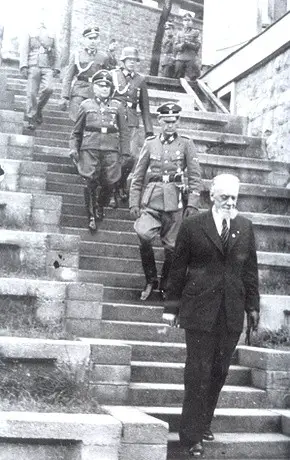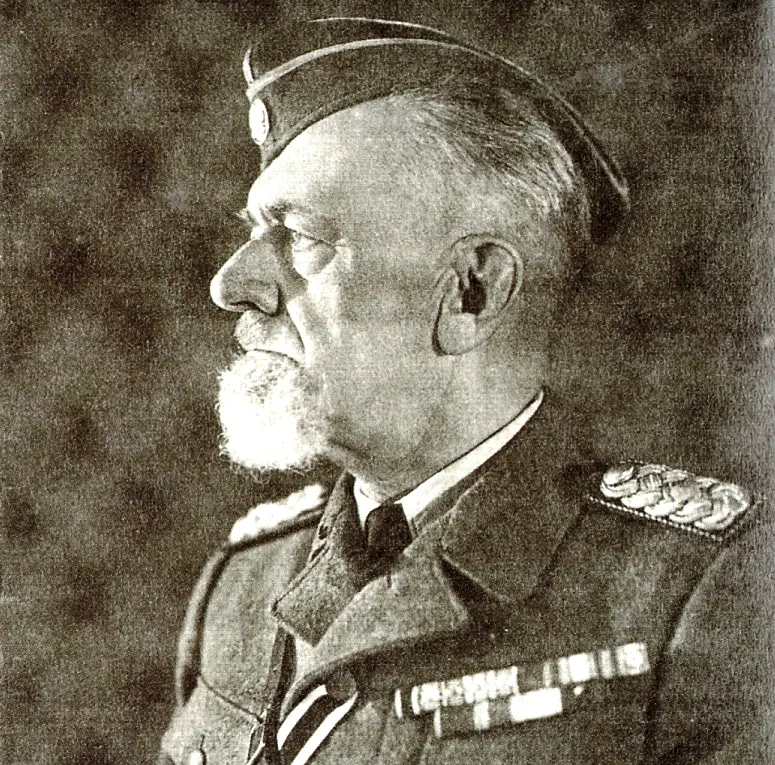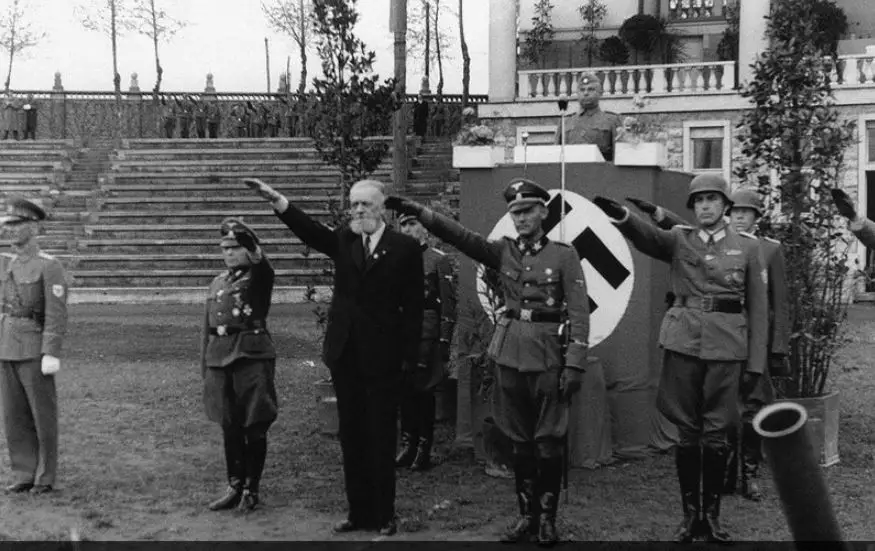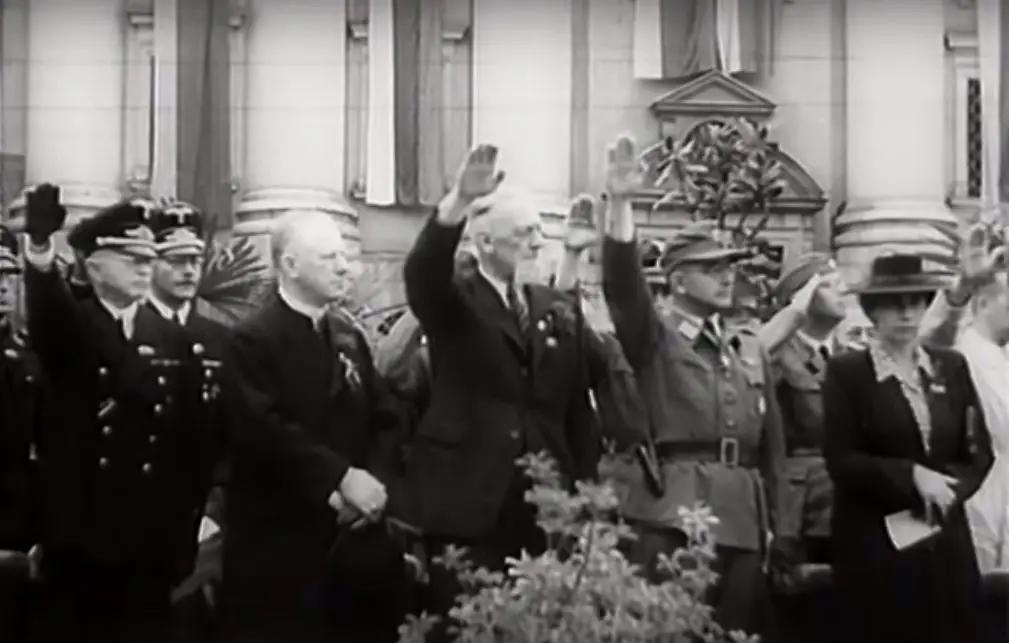Ljubljana related
STA, 8 June 2021 - The National Assembly Speaker Igor Zorčič and National Council Speaker Alojz Kovšca have condemned a t-shirt displaying an image of the late collaborationist general Leon Rupnik in the parliament building. The person holding the t-shirt took a picture in the National Council chamber, news portal 24ur.com reported.
The picture shows Aleš Ernecl, editor-in-chief of the National Press Agency (NTA). The NTA had plans earlier in the year to become one of the major media outlets in Slovenia, but things went wrong when Ernecl described the agency as a 'fascist media' outlet. He later said the statement was just him being sarcastic.
Ernecl posted the photo on Twitter with a caption reading "Leon's home again" in another move that has raised dust in the public. The picture was taken during Ernecl's visit to Zmago Jelinčič, the leader of the National Party (SNS), according to 24ur.com.
Leon spet doma. pic.twitter.com/BzGPmRdvfB
— ALEŠ ERNECL (@alesernecl) June 7, 2021
Leon Rupnik being a Nazi in Ljubljana. Photo: Wikipedia, public domain
Representatives of the National Council, the upper chamber of Slovenia's parliament, told the portal that Ernecl had not been invited to the parliament building by the National Council.
Kovšca said it was unacceptable "to provoke the public with an abuse of the National Council institution", noting that the upper chamber of the parliament was the home of civil society, democracy and pluralism.
He also advised Ernecl and everybody else to wear or display Slovenian national symbols, and distanced himself from any display of collaborationist or totalitarian symbols.
Also commenting on the provocation, Zorčič said that in line with the parliament rules and customs, everyone who enters the building should be dressed appropriately.
"If you ask me, such a t-shirt was inappropriate," he said, adding that he did not know who let Ernecl in the parliament dressed like that.
Jelinčič, who hosted Ernecl on Monday, described the move as a "stupid provocation and attention seeking". "Some with Che Guevara and the red star, others with Rupnik. Both is stupid," he said.
An army general during the First World War, Rupnik (1880-1946) headed the Provisional Government of the Nazi-occupied Province of Ljubljana and served as chief inspector of the Domobranci (Slovene Home Guard), a collaborationist militia, during WWII.
He led the Home Guard in an oath of allegiance on Adolf Hitler's birthday on April 20 in 1944.
In May 1945, he fled to Austria where he was arrested by the British and returned to Yugoslavia in early 1946. He was court-martialed along with several other people and sentenced to death for treason and collaboration, and executed by a firing squad in September 1946.
In 2019, the Supreme Court quashed Rupnik's guilty sentence on an appeal on a point of law lodged by his relative, and sent the case to the Ljubljana District Court for retrial.
The proceedings were then stopped as the Ljubljana District Court argued that a dead person could not be put on trial.
STA, 5 March 2020 - The Association of WWII Veterans, the Jewish Community in Slovenia and six victims of the WWII Home Guard militia have petitioned the Constitutional Court to review the recent decision of the Supreme Court to annual the 1946 treason verdict of Leon Rupnik, a Nazi collaborationist general.
Law firm Završek & Šnajder said on Thursday that the Supreme Court's decision to order a retrial was a grave interference in the dignity of its clients, "their right to safety, their personal rights, and a violation of international standards and treaties Slovenia must comply with".

Leon Rupnik, leading the way for Nazis in Bežigrad Stadium, Ljubljana. Wikimedia
Rupnik (1880-1946) was sentenced to death by court martial and executed in September 1946 for treason and collaboration with the occupying forces.
In 2014, Rupnik's relatives challenged the verdict in Supreme Court, which recently annulled it for being insufficiently explained.
Rupnik's relatives could petition the Supreme Court on a point of law on the basis of changes to the penal code passed in the 1990s that introduced an extraordinary legal remedy to review the cases of those who were unlawfully or unjustly sentenced under the former communist regime.
Leon Rupnik, saluting the Nazi flag in Kongresni trg, Ljubljana. Screenshot
Meanwhile, public broadcaster Radio Slovenija reported today that the Ljubljana city authorities also decided to challenge the Supreme Court's decision at the Constitutional Court. A press conference is scheduled for Wednesday.
The radio also reported that Maribor-based jurist Rok Lampe had filed a request for constitutional review. However, the request has been denied by the Constitutional Court because he failed to prove interest to bring proceedings.
All our stories on the Leon Rupnik case are here
STA, 31 January - Slovenian WWII veterans intend to ask the Constitutional Court to review the recently annulled 1946 guilty verdict of Leon Rupnik, a Nazi collaborationist general. The Association of WWII Veterans is also considering appealing at the European Court of Human Rights.
It said "several people have turned to us who were direct victims of the Domobranci militia's cruel terror dictated by Leon Rupnik in collaboration with the occupying forces of Slovenian lands".
The association said in a press release on Thursday that it had also urged Human Rights Ombudsman Peter Svetina to take action to protect the victims' dignity.
Its president Marijan Križman called on Svetina last week "to not let the collaboration with the occupying forces be honoured in Slovenia".
Križman wrote to Svetina that due to the Supreme Court's unreasonable annulment of the verdict, the association members "feel hurt and expect action".
Pro-Nazi General Rupnik (1880-1946) was sentenced to death by court martial and executed in September 1946 for treason and collaboration with the occupying forces.
The Supreme Court, petitioned in 2014 by Rupnik's relatives, annulled the verdict for being insufficiently explained, and sent the case into retrial.
Rupnik's relatives could petition the Supreme Court on a point of law on the basis of changes to the penal code passed in the 1990s, after Slovenia gained independence.
The changes introduced an extraordinary legal remedy to rehabilitate those who were unlawfully or unjustly sentenced under the former communist regime before 1990.
However, the deadline for direct petitions by relatives has already expired. They can now send a request for legal remedy to the prosecution, which then decides if a petition is justified.
While Rupnik's is probably one of the last annulled verdicts from the communist regime, the state has received almost 700 claims for damages related to the annulments.
The State Attorney's Office has told the STA that the great majority of the claims were filed in 1995-2005 and have already been closed.
The majority have been settled out of court; a settlement has been reached in almost 460 cases and almost 165 claims have been rejected.
Of a total of 126 cases that went to court, 19 lawsuits ended to the benefit of the plaintiffs, while the plaintiffs were not successful in 37 cases, 16 cases ended in a settlement, seven lawsuits have been withdrawn and one rejected.
While the damages claims ranged from EUR 1,200 to EUR 2.5 million, the State Attorney's Office has not provided the figures about the actual damages awarded.
It has explained "the claims ended more than ten years ago" and gathering the data about them would entail time-consuming studying of archived documents.
But it has said the suits and claims for damages were related to a number of different situations, such as imprisonment on the Goli Otok island and at Stara Gradiška prison, both in present-day Croatia, or death sentences.
However, the amount of the damages awarded depended significantly on whether the claim had been made by the victim or their heirs, whether a prison or death sentence had been involved, in which prison the victim had served time and for how long, and to what extent the victim had managed to recover from the experience.
STA, 14 January 2020 - The Simon Wiesenthal Center, a human rights organisation researching the Holocaust, on Tuesday criticized the recent decision by the Slovenian Supreme Court to annul the 1946 conviction of Leon Rupnik, who headed the Provisional Government of the Nazi-occupied Province of Ljubljana.
In a letter sent to the Slovenian ambassador in Israel, the organisation said the "notorious anti-Semite" had played "a major role in the arrest and deportation of Jews from Ljubljana in 1943 and 1944" and actively participated in Holocaust crimes.
"This shameful decision constitutes a shocking distortion of the history of the Holocaust and a horrific insult to Rupnik's many victims and their families, the centre's director of Eastern European Affairs Efraim Zuroff said.
"We kindly request that you promptly convey our protest to the pertinent Slovenian authorities so that the proper measures can be taken to undo the enormous damage wrought by this unjust decision of the Slovenian Supreme Court," he said according to a press release published on the organisation's web page.
The Jewish Cultural Centre Ljubljana responded to the Supreme Court's decision last week with "indignation and concern", saying that it was the "first step in the politically-motivated aspiration to rehabilitate the criminal collaborationist regime during WWII".
After annulling the Rupnik verdict, the Supreme Court ordered a retrial, but since it is impossible under Slovenian law to try a dead person - Rupnik was court-martialled and executed for treason in 1946 - the most likely outcome seems to be a termination of procedure.
You can see videos of Leon Rupnik as the main speaker at a pro-Nazi rally in the centre of Ljubljana, saluting a Nazi flag, below
More on this story can be found here
STA, 10 January 2020 - The Supreme Court's controversial annulment of the guilty sentence for a WWII collaborationist general has raised questions about the legal and historical implications of the decision. While the court has ordered a retrial, the most likely outcome seems to be a termination of procedure.
The Supreme Court recently annulled the death sentence of Slovenian general Leon Rupnik (1880-1946), who collaborated with the occupying forces during World War II, on an appeal on a point of law lodged by his relative, and sent the case to the Ljubljana District Court for retrial.
Rupnik was a general in the Kingdom of Yugoslavia in WWI and later collaborated with the Fascist Italian and Nazi German occupation forces during World War II. He served as the head of the Provincial Government of the Nazi-occupied Province of Ljubljana in 1943-1945, and was also chief inspector of the Domobranci (Slovene Home Guard), a collaborationist militia.
The Supreme Court's ruling rests on procedural grounds: the court held that the military court's ruling had not been sufficiently reasoned, even under the standards applicable at the time.
The annulment means the case will now be sent into retrial, and Miha Hafner, an associate professor at the Ljubljana Faculty of Law, believes it will either be thrown out by the prosecution, or that the court will declare it cannot conduct a retrial since the accused is already dead.
Under the criminal procedure act, courts cannot try dead persons, which means that Rupnik's guilt will not be examined once again, Hafner told the STA.
The end effect of the Supreme Court decision, therefore, is that "since the procedure will be terminated whereas the previous ruling was annulled and the presumption of innocence applies [in Slovenia], Rupnik cannot legally be regarded as guilty of this criminal act," according to Hafner.
Hafner stressed, however, that the decision does not strictly mean Rupnik is rehabilitated. "If the gentleman were still alive, a retrial would start and the court of first instance would carry out the entire procedure."
Another consequence of the ruling may be that Rupnik's heirs may claim the return of property since Rupnik's property was seized by the state after the trial, said Hafner.
The ruling has earned the Supreme Court fierce criticism, in particular from the left, but the court told the STA it had no other choice than to decide on the Rupnik heir's appeal on a point of law.
All our stories on Leon Rupnik are here
At the Jewish Cultural Centre in Ljubljana we were shocked and deeply concerned to learn about the decision of the Slovenian Supreme Court to annul the sentence of Leon Rupnik from 30 August 1946, and to return it for retrial.
It is our assessment that we are witnessing the first step in a politically motivated ambition to rehabilitate the criminal collaborationist regime in Slovenia during WWII whose “president” was the aforementioned Leon Rupnik, and who was justly tried and sentenced to death as a war criminal, and whom even the pre-war Yugoslav Royal Government, then in exile, renounced as a traitor.
Rupnik’s police under the leadership of Lovro Hacin, likewise sentenced and executed in 1946 as a war criminal, organised the arrests and deprtations of the remaining Slovenian Jews in Ljubljana and its vicinity in the years 1943 and 1944; very few have survived. The Homeguard (Domobranci) military formations that pledged allegiance to Hitler Rupnik led into a criminal, fratricidal war. The Homeguard also collaborated in the Holocaust against the Jews in the Trieste region under the leadership of the infamous SS officer and war criminal Odilo Globočnik in the years 1944 - 1945.
The Jewish Cultural Cenre Ljubljana will notify the world public about the shameful decision of the Slovenian Supreme Court. We will monitor closely all and any further developments of these contemptible acts of Holocaust denial, revision and perversion of history, and attempts at reviving and justifying the Fascist and Nazi horrors, and oppose them indefatigably.
Robert Waltl, director JCC Ljubljana
You can see videos of Leon Rupnik as the main speaker at a pro-Nazi rally in the centre of Ljubljana, saluting a Nazi flag, below
More on this story can be found here
STA, 9 January 2020 - The Association of WWII Veterans is appalled by the Supreme Court's annulment of the death sentence of Slovenian general Leon Rupnik (1880-1946), saying that numerous documents undoubtedly prove that he actively collaborated with the Fascist Italian and Nazi German occupation forces. Protest has also been expressed by the Social Democrats (SD).
The association promoting the values of the resistance movement in WWI said on Thursday it had received with indignation the report by the newspapers Dnevnik and Večer about the verdict against Rupnik being sent for retrial at the Ljubljana District Court.
Rupnik collaborated with the occupation forces during WWII as he served as the head of government of the Nazi-occupied Province of Ljubljana in 1943-1945, and was also chief inspector of the Domobranci collaborationist militia.
In May 1945, he fled to Austria, where he was arrested by the British and returned to Yugoslavia in early 1946. He was court-martialled and executed for treason and collaboration with the occupiers later that year.
One of his descendants, allegedly a grandson, had filed an appeal on a point of law, arguing that the verdict had not been sufficiently explained, that the reasons conflict each other, that his right to defence was violated, and that judges who had reached the verdict should have been excluded.
The appeal has now been granted by the Supreme Court, the verdict annulled and the case returned to the Ljubljana District Court for retrial.
The Association of WWII Veterans said in its response that Rupnik was also the mayor of Ljubljana under Nazi Germany and that he "led the treasonous fight against his own nation and subjected himself to the ideas of Nazism."
According to its president Marijan Križman, treason cannot be erased even with "bureaucratic pardon of the crimes that the traitors had committed against their own nation."
Court has thus become a tool for those who are not able to get over the shame and pain of treachery and use the judicial system for retaliation and spreading of hatred."
The Social Democrats (SD) said it would never accept "those who preferred collaboration with the occupier to the survival of the nation get acquitted," adding that Rupnik was "loyal to the alliance with the occupier to the last moment."
The party said that "untruthful interpretation of Slovenian history with rehabilitation of collaboration and Fascism" did not lead to reconciliation, but only takes Slovenians further away from dealing with the past.
The Jewish Cultural Centre Ljubljana also responded to the Supreme Court's decision with "indignation and concern", saying that it was the "first step in the politically-motivated aspiration to rehabilitate the criminal collaborationist regime during WWII".
It noted that Rupnik's police, under the leadership of the co-defendant Lovro Hacin, had organised in 1943 and 1944 arrests and deportations of Slovenian Jews from the Province of Ljubljana, with only a handful of them surviving the ordeal.
STA, 8 January - The Supreme Court has annulled the death sentence of Slovenian general Leon Rupnik (1880-1946), who collaborated with the occupying forces during World War II, on an appeal from his relative, and sent the case to the Ljubljana District Court for retrial, the newspapers Dnevnik and Večer reported on Wednesday.
Rupnik was a general in the Kingdom of Yugoslavia in WWI and later collaborated with the Fascist Italian and Nazi German occupation forces during World War II.

Wikipedia, CC-by-0
He served as the president of the Provincial Government of the Nazi-occupied Province of Ljubljana in 1943-1945, and was also chief inspector of the Domobranci (Slovene Home Guard), a collaborationist militia.
In May 1945, Rupnik fled to Austria, where he was arrested by the British and returned to Yugoslavia in early 1946. He was court-martialled along with several other people and sentenced to death for treason and collaboration with the occupiers later that year.
Rupnik on stage with fellow Nazis in Ljubljana
The verdict was confirmed by the Supreme Court of the Yugoslav Army, and the appeal for clemency was rejected on 2 September 1946.
Rupnik was executed by firing squad in Ljubljana on the same day and buried in Žale Cemetery in an unmarked grave.
One of his descendants, allegedly a grandson, had filed an appeal on a point of law through an attorney, and the appeal has now been granted by the Supreme Court.
The part of the verdict relating to Rupnik has been annulled and the case has been returned to the Ljubljana District Court for retrial.
According to the newspapers, the court says that the verdict was not in compliance with the legal principles at the time, and that not all accusations of the acts he had been sentenced for had been supported with facts and circumstances.
For one of the acts the court has found that it does not bear signs of a criminal act.
Rupnik's relative claimed, among other things, that the verdict had not been sufficiently explained, that the reasons conflict each other, that he was violated his right to defence, and that judges who had reached the verdict should have been excluded.






